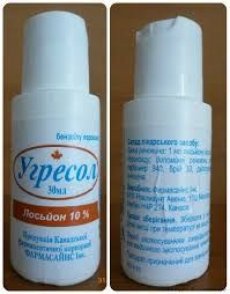Medical expert of the article
New publications
Preparations
Ugresol
Last reviewed: 03.07.2025

All iLive content is medically reviewed or fact checked to ensure as much factual accuracy as possible.
We have strict sourcing guidelines and only link to reputable media sites, academic research institutions and, whenever possible, medically peer reviewed studies. Note that the numbers in parentheses ([1], [2], etc.) are clickable links to these studies.
If you feel that any of our content is inaccurate, out-of-date, or otherwise questionable, please select it and press Ctrl + Enter.

The drug ugresol belongs to a group of medications used in the treatment of acne. The active substance of the drug is benzoyl peroxide. Additional components: disodium edetate, carbopol 940, diisopropanolamine, water.
Dosing and administration
Method of administration and dosage of the drug: apply a thin layer of ugresol to the affected areas of the skin and rub in with massage movements. The skin should be cleaned and dried beforehand. On the first day of use, apply ugresol to the skin once, then, if necessary, two to three times a day. The maximum effect occurs two to three months after the start of using the drug. The total duration of treatment is twelve weeks. The drug is contraindicated in the elderly. In severe cases of the disease, ugresol can be combined with other anti-acne agents. Shake the drug before use.
Use Ugresol during pregnancy
The use of Ugresol during pregnancy is possible only after consultation with a doctor in the absence of contraindications and an allergic reaction to benzoyl peroxide.
Side effects Ugresol
Side effects of ugresol: the drug can provoke irritant reactions of the skin, which are characterized by their redness, swelling, as well as a feeling of itching and burning. Minor irritation can be eliminated by reducing the number of applications of the drug to once a day or using it once every two days. In case of excessive irritation of the skin, the use of ugresol should be discontinued.
Overdose
Overdose of the drug Ugresol can cause the following symptoms:
- Redness of the skin;
- Burning and itching;
- Swelling and peeling of the skin;
- Feeling of dry skin.
If the above symptoms occur, the skin should be lubricated with vegetable oil using a cotton or gauze swab. If the symptoms do not disappear for a long time or cause severe discomfort, you should seek help from a dermatologist. In some cases, to neutralize negative reactions, it may be necessary to use external agents containing glucocorticosteroids.
Interactions with other drugs
The interaction of ugresol with other drugs for the elimination of acne can provoke a hypersensitivity reaction of the skin. Among them are drugs that contain resorcinol, phenolic acid, sulfur, tritenoin, alcohol, including products used during or after shaving, as well as various cosmetics containing such components. The combined use of the drug ugresol with other drugs for the treatment of acne is possible only after consultation with a dermatologist.
Special instructions
When using the drug, it is necessary to avoid its penetration into the eyes, as well as onto mucous surfaces. The drug can discolor hair and eyebrows. Before using Ugresol, an allergic reaction test should be performed, for this a small amount of lotion is applied to the wrist or elbow bend.
If red spots, burning, peeling skin or itching appear in these areas within forty-eight hours, the use of the drug is prohibited.
Shelf life
Attention!
To simplify the perception of information, this instruction for use of the drug "Ugresol" translated and presented in a special form on the basis of the official instructions for medical use of the drug. Before use read the annotation that came directly to medicines.
Description provided for informational purposes and is not a guide to self-healing. The need for this drug, the purpose of the treatment regimen, methods and dose of the drug is determined solely by the attending physician. Self-medication is dangerous for your health.


 [
[